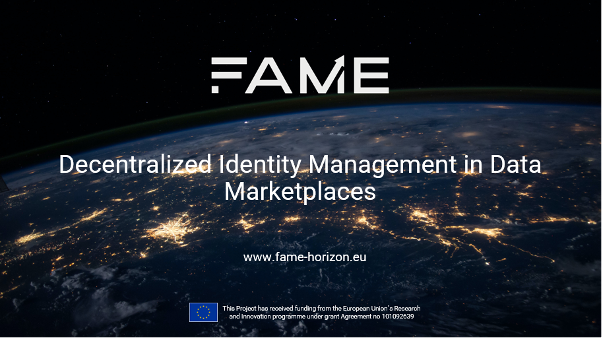Self-Sovereign Identity (SSI) represents a transformative approach in the realm of digital identity management. Shifting away from traditional, centralized models, SSI places the control of personal identity squarely in the hands of individuals. By leveraging advanced technologies like blockchain and cryptography, it enables users to create, manage, and present their own identities without reliance on central authorities or intermediaries. This paradigm shift not only enhances user privacy and data security but also fosters a new level of autonomy and trust in digital interactions. The implications of SSI are vast, potentially reshaping the landscape of online identity verification, access management, and personal data control, promising a more secure and user-empowered digital future.

The FAME project, aimed at creating a federation of Data Marketplaces, integrates Self-Sovereign Identity (SSI) to revolutionize how digital identities are managed and authenticated within its network. SSI, a paradigm shift from centralized identity management, empowers users to control their identities using decentralized technologies.
Work Package 3, specifically Task T3.1, is instrumental in implementing this Authentication and Authorization infrastructure (AAI). More specific, it focuses on specifying and developing an infrastructure that supports SSI and facilitates access to data from federated marketplaces. The task involves extending the i3-MARKET platform with interfaces for data trading, pricing, and policy management, enhancing data exchange models and ontologies. This integration of SSI within FAME’s infrastructure exemplifies innovation in data management and security, showcasing a shift towards decentralized identity management in digital data exchanges.
Key features of FAME’s AAI include:
- Data Provider Interface (DPI): Facilitates the integration of various marketplaces and data spaces with FAME, enabling them to offer their assets.
- Abstract Data Policy Management: Unifies security and data protection mechanisms across different platforms, ensuring data policies align with those of underlying data providers.
- Regulatory Compliance Tools: These tools ensure adherence to laws like GDPR, PSD2, and the 4AML, enhancing legal compliance.
The Self-Sovereign Identity (SSI) model plays a pivotal role in the strategy of FAME (Framework for Authentication Management in Ecosystems) to address the limitations of centralized identity models. This approach is centered around two key technologies: Distributed Identifiers (DID) and Verifiable Credentials (VC).
Distributed Identifiers (DID):
- Unique and Persistent: DIDs are unique identifiers that are persistently linked to a user’s decentralized digital identity.
- Decentralization: Unlike traditional models, DIDs operate without the need for a central authority. This decentralization is critical in ensuring user control over personal identity.
- Blockchain-based: The storage of DIDs on distributed ledgers or blockchains enhances security. It ensures that these identifiers are tamper-resistant and managed in a transparent manner.
Verifiable Credentials (VC):
- Digital Credentials: VCs are digital counterparts of physical credentials (like a driver’s license) but are imbued with cryptographic proofs. This ensures their authenticity and integrity.
- Issuance and Storage: These credentials are issued by authoritative entities such as governments or educational institutions. Users can store these VCs in their digital wallets, which act as a secure repository.
- User Control and Privacy: By allowing users to manage their VCs, the model places the control of personal data back into the hands of the user.
FAME leverages these technologies to create a user-centric authentication model. This model not only enhances user privacy and reduces unnecessary exposure of personal data but also improves interoperability and integration across various platforms. The goal is to create a more secure, transparent, and user-friendly digital identity ecosystem.
The main actors in a Self-Sovereign Identity (SSI) ecosystem are:
- Users (Identity Owners): They create and control their digital identities using tools like Distributed Identifiers (DID) and Verifiable Credentials (VC), thus becoming the central figures in managing their personal data.
- Verifiers: These entities, such as data marketplaces in FAME, verify the authenticity of credentials presented by users without needing to contact the credential issuer directly.
- Issuers: These are trusted entities that issue VCs to users, affirming certain attributes or qualifications.
Self-Sovereign Identity (SSI) introduces a transformative approach to managing digital identities, offering numerous benefits over traditional, centralized models. Here are some of the key advantages:
Enhanced Privacy and Control
- User Empowerment: SSI places the control of identity data squarely in the hands of users. They can decide exactly what information to share and with whom, tailoring disclosure to the requirements of each transaction.
- Reduced Identity Theft Risks: By minimizing the amount of personal information shared and stored centrally, SSI significantly lowers the risk of identity theft and fraud.
Interoperability
- Cross-Platform Functionality: SSI systems are built to seamlessly operate across different platforms and jurisdictions. This characteristic is particularly beneficial in global transactions, where diverse identity systems often intersect.
- Universal Standards: The interoperable nature of SSI fosters the adoption of universal standards, simplifying identity verification across various systems and sectors.
Reduced Reliance on Centralized Entities
- Enhanced Security: The decentralized nature of SSI ensures a more secure and resilient identity management framework, as there is no central repository of sensitive personal data.
Overall, FAME’s AAI infrastructure, therefore, allows secure access, trade, and use of data across various data infrastructures, complying with security and regulatory demands of EmFi applications. This comprehensive approach showcases a significant move towards decentralized identity management in digital data exchanges.
InQbit will play a pivotal role in FAME’s WP3 tasks. With its expertise in the Self-sovereign identity (SSI) model, the company will offer its services during the creation of the AAI infrastructure.
